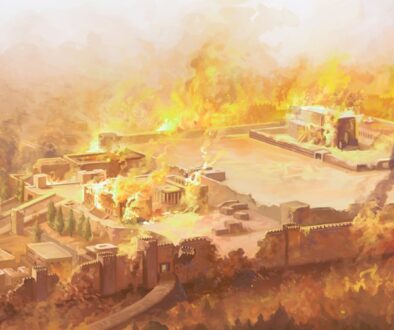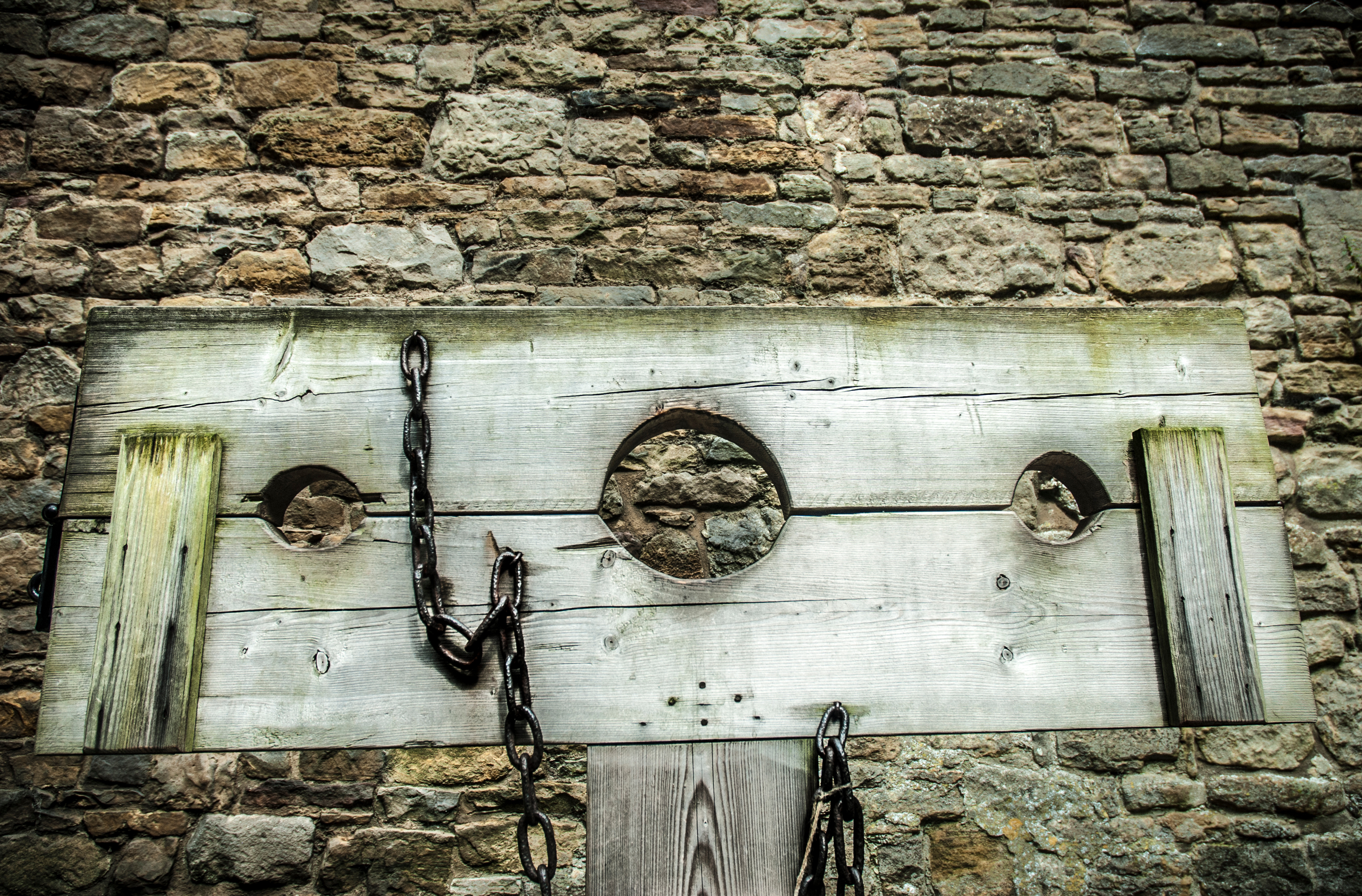Judges Jephthah

Jephthah was lifted up to deliver Israel AGAIN. His life was not an easy one, either before being called or after. But he was a man of his word.
Jephthah life was hard because of his own family. He was an illegitimate son; the son of a prostitute. I’m curious here, and I’m probably getting into an indelicate area, but how did they KNOW who his father was? Was the woman more of a concubine than a prostitute? Concubines had one partner where a prostitute could have MANY partners. Did they call the woman a prostitute simply because she wasn’t their father’s wife? We know how Tamar played the role of a prostitute ONE time and bore Judah sons of their one-time union. Was this relationship something like that one?
Whatever the parent’s relationship, the sons recognized Jephthah as their half-brother. And they refused to allow him to inherit along with them. They drove him out of the city and away from his own people. We don’t know how old Jephthah was when they did this. We are told that his brothers were grown-up when they chased him away. And their father never did anything to change this. I wonder if they were spurred on by their mother. Just my two cents, and my forever questioning mind at work.
Although Jephthah is the latest ‘hero’ of Israel, our story doesn’t start there. Our story backs up to the death of Abimelech. There was no more deserved death than Abimelech. We have very little information on the two judges that were raised up after Abimelech, but we see Israel, once again, ‘climb back into bed’ with the false gods all around her. Let’s pick up our story there.
♥ ♦ ♥
“They’re doing it AGAIN” the Spirit says with exasperation.
Jesus shakes His head. “They certainly are. And this time they’re going after ALL the gods around them.”
“They make my skin crawl when they act this way” Father says.
“What are we going to do about it this time” asks the Spirit.
“The same thing we always do; give them over to oppression” replies Father.
“We never really lifted the last oppression” Jesus comments.
“Not fully, but this one will REALLY get their attention. We are going at them from both sides this time” Father states.
The Philistines begin to press Israel from the eastern side and the Ammonites from the west. Israel is squeezed between the two nations. Both are intent on ruling Israel. The Ammonites started their reign of oppression with the tribes on the eastern side of the Jordan. The Philistines acted against Judah first. For eighteen years Israel has endured this two-sided push. Until the Ammonites decide that they want to go deeper into the heart of Israel.
The Ammonites have crossed the border. They begin oppressing the people of Judah, Benjamin, and Ephraim. The people are feeling the severe squeeze.
“Enough of this! I can’t take it anymore” complain the people.
“If they would fight one another over control, maybe we would get some relief then.”
“We would just be crushed in the middle of them.”
“So what are we supposed to do?”
One man, who has remained true to the Lord, speaks up. “We need to STOP chasing after other gods! Remember the blessings and curses Moses wrote down? We are suffering justly deserved curses for turning away from the Lord.”
“He’s right! When our fathers found themselves in trouble, they always turned to the Lord; and He saved them. We have to do this too!”
“I don’t know if it will be that simple this time. We have sinned with far too many gods and for far too long. I don’t know if we are beyond redemption. We KEEP doing the SAME things our fathers did.”
“We HAVE to try! We have no other hope.”
A message went out from the heart of Judah. “Call out to the Lord for deliverance! Turn back to Him. He is our only hope!”
The people all recognized the truth of the message and began calling out to the Lord. “We have sinned against you, because we have forsaken our God and have served the Baals.” (Judges 10:10)
“They’re doing it again” commented the Spirit. “The calling out to us for help.”
“Yes. They are” replied Father.
“What are We going to do about it? Are We going to save them; again” asked Jesus.
“Maybe later. Right now, I’m too hurt by their actions. I have a message for them though” said Father.
Father speaks to the high priest at the Tabernacle. “Say to My people: ‘Did I not save you from the Egyptians and from the Amorites, from the Ammonites and from the Philistines? The Sidonians also, and the Amalekites and the Maonites oppressed you, and you cried out to me, and I saved you out of their hand. Yet you have forsaken me and served other gods; therefore I will save you no more. Go and cry out to the gods whom you have chosen; let them save you in the time of your distress.’ (Judges 10:11-14)”
When the high priest heard this message, he tore his clothes and cried out in pain. “The Lord is abandoning us because of OUR sin!”
The silver trumpets were pulled from storage. They hadn’t been used is as long as the high priest could recount. Certainly not in his lifetime. If there ever was a time to call the tribes together though, it was NOW. The high priest knew that the silver trumpets wouldn’t reach every tribe, so messengers were sent to call them all. But if there ever was a time to return to the old ways, this was it.
Two days later, the leaders of all the tribes arrive in Shiloh at the Tabernacle. The high priest has held off telling any of the tribes the Lord’s message. “They all need to hear it together” he surmises. The high priest waits in the customary place Moses used to occupy while the assembly quiets itself. When all are ready, he steps up and tells them of the Lord’s answer.
“But the other gods can’t save us like He can” they moan.
“THEN WHY DO YOU BOW DOWN TO THEM!” demanded the high priest.
Every one of the leaders present recognized the truth of what was said. They tore their robes in sorrow and cried out to the Lord. “We have sinned; do to us whatever seems good to you. Only please deliver us this day.” (Judges 10:15)
They each returned to their territory and ensured that their people put away the false gods and cried out to the Lord for forgiveness and mercy. And they kept crying out.
“They are falling in line again” the Spirit said.
“For how long this time” Jesus asks.
“Probably until their situation is resolved” said the Spirit.
“Probably. But I’m tired of seeing their plight. It’s time to address this” the Father answers.
“Who are we sending this time” asks Jesus.
“Someone they would least expect. Jephthah” answers Father.
The Spirit chuckles. “I’ve got to watch this!”
Jephthah is an outcast in Israel. He is from the town of Gilead, on the eastern half tribe of Manasseh. He has been pushed from his own hometown by his half-brothers. Jephthah didn’t share a mother with his brothers, but was the son of a union between their father and a prostitute. The brothers refused to allow him to inherit with them from their father. And, although Jephthah was a might warrior, he ran from his brothers and lived in the land of Tob. He chose separation over retaliation.
While living in the land of Tob, Jephthah acquired a following of sorts. This was a place where ‘worthless men’ lived. They saw something of worth in Jephthah and collected around them. He became their leader, but not for evil.
Jephthah is living out his life quietly when the Ammonites decided to press hard on Israel. The Ammonites encamp at Gilead and the people of Israel came together and encamped at Mizpah. Israel is scared, but they don’t back down. The leaders of Gilead call out for a champion to lead them in battle.
“Who is the man who will begin to fight against the Ammonites? He shall be head over all the inhabitants of Gilead.” (Judges 10:18)
All of a sudden, the name and character of Jephthah comes to their minds. The elders of Gilead decide that Jephthah is the man to deliver them. They go together to the land of Tob in search of Jephthah. When they find him they ask for his help; with a promise at the end.
“Come and be our leader, that we may fight against the Ammonites.” (Judges 11:6)
Jephthah looks at them with suspicion. “Did you not hate me and drive me out of my father’s house? Why have you come to me now when you are in distress?” (Judges 11:7)
“That is why we have turned to you now, that you may go with us and fight against the Ammonites and be our head over all the inhabitants of Gilead” (Judges 11:8) they pleaded.
Jephthah knew they were desperate, but he wasn’t going without a solemn oath. “If you bring me home again to fight against the Ammonites, and the Lord gives them over to me, I will be your head.” (Judges 11:9)
The leaders of Gilead WERE desperate and would do anything to seal this bargain. “The Lord will be witness between us, if we do not do as you say.” (Judges 11:10)
Jephthah agreed to go with the leaders of Gilead. Together, they met up with the armies of Israel ad Mizpah. Jephthah made the leaders again swear in front of Israel their oath to make him their leader. The rest of Israel agreed to the terms. Jephthah, once the outcast from his own people, was the leader of Israel’s army.
Jephthah was a wise man as well as strong. “Why fight when you don’t need to” was his motto. He saw it as a waste of lives when there might be other options. To this end, Jephthah sent messengers to the king of the Ammonites.
“What do you have against me, that you have come to me to fight against my land?” (Judges 11:12)
The king of the Ammonites was bold and brash. He saw this as a chance to ‘talk’ Israel into giving up. His answer was a partial truth that he hoped would cause ‘frightened’ Israel to withdraw from the land. “Because Israel on coming up from Egypt took away my land, from the Arnon to the Jabbok and to the Jordan; now therefore restore it peaceably.” (Judges 11:13)
When Jephthah received the king’s reply, he nearly laughed. “He has a history lesson coming” reasoned Jephthah. He crafted a reply to the king’s erroneous assumptions.
“Thus says Jephthah: Israel did not take away the land of Moab or the land of the Ammonites, but when they came up from Egypt, Israel went through the wilderness to the Red Sea and came to Kadesh. Israel then sent messengers to the king of Edom, saying, ‘Please let us pass through your land,’ but the king of Edom would not listen. And they sent also to the king of Moab, but he would not consent. So Israel remained at Kadesh.
“Then they journeyed through the wilderness and went around the land of Edom and the land of Moab and arrived on the east side of the land of Moab and camped on the other side of the Arnon. But they did not enter the territory of Moab, for the Arnon was the boundary of Moab. Israel then sent messengers to Sihon king of the Amorites, king of Heshbon, and Israel said to him, ‘Please let us pass through your land to our country,’ but Sihon did not trust Israel to pass through his territory, so Sihon gathered all his people together and encamped at Jahaz and fought with Israel. And the Lord, the God of Israel, gave Sihon and all his people into the hand of Israel, and they defeated them. So Israel took possession of all the land of the Amorites, who inhabited that country. And they took possession of all the territory of the Amorites from the Arnon to the Jabbok and from the wilderness to the Jordan. So then the Lord, the God of Israel, dispossessed the Amorites from before his people Israel; and are you to take possession of them? Will you not possess what Chemosh your god gives you to possess? And all that the Lord our God has dispossessed before us, we will possess. Now are you any better than Balak the son of Zippor, king of Moab? Did he ever contend against Israel, or did he ever go to war with them? While Israel lived in Heshbon and its villages, and in Aroer and its villages, and in all the cities that are on the banks of the Arnon, 300 years, why did you not deliver them within that time? I therefore have not sinned against you, and you do me wrong by making war on me. The Lord, the Judge, decide this day between the people of Israel and the people of Ammon.” (Judges 11:15-27)
The king of Ammon was not impressed by Jephthah’s message. He refused to even respond to the message; at least to Israel. He sent word to his commanders to be ready to go to battle against Israel. “Strengthen the lines! They are relying on their God to save them. The same God who allowed us to come in and oppress them until now.”
The Spirit of the Lord covered Jephthat and gave him strength and determination. He knew that Ammon was not going to withdraw. It was now his time to stand against them. Jephthah took the fight to the heart of Ammon’s camp, leading the men of Gilead with him. Just before engaging in battle, Jephthah made a vow to the Lord.
“If you will give the Ammonites into my hand, then whatever comes out from the doors of my house to meet me when I return in peace from the Ammonites shall be the Lord’s, and I will offer it up for a burnt offering.” (Judges 11:30-31)
The Lord did indeed give the armies of Ammon into Jephthah’s hand. He plowed through 20 cities of the Ammonites and struck such a severe blow that Ammon was subdued completely before Israel.
After completing the campaign, Jephthah and the men of Gideon returned home. As Jephthah approached his home, his daughter came out of his house, dancing with a tambourine. She was celebrating her father’s victory and the hand of Ammon being broken from the back of Israel.
Jephthah fully remembered the vow he had made to the Lord just before the battle. His daughter was the “first thing” to come through his door, and he had VOWED to offer whatever the first thing was as a burnt offering.
Jephthah falls to his knees tears his clothes and lets out a mournful cry. His daughter stops dancing at the sight of her father’s distress. She runs to him. “Abba! What is the matter?”
“Alas, my daughter! You have brought me very low, and you have become the cause of great trouble to me. For I have opened my mouth to the Lord, and I cannot take back my vow.” (Judges 11:35)
His daughter kneels beside him. She knows her father’s heart. He will not break a vow to the Lord, and whatever it is, is BAD. And it involves her. She rightly surmises that it means her death. Rather than rail against her father, she bows to his authority. She puts her hand on his arm as comfort.
“My father, you have opened your mouth to the Lord; do to me according to what has gone out of your mouth, now that the Lord has avenged you on your enemies, on the Ammonites.” (Judges 11:36)
She removes her hand from her father’s arm and puts both her hands in her lap. Her head bows as she feels the weight of what is being asked of her. She has a request of her own.
“Let this thing be done for me: leave me alone two months, that I may go up and down on the mountains and weep for my virginity, I and my companions.” (Judges 11:37)
Jephthah wraps her in his arms. Grateful for her understanding and for her request. He will have two months more with his daughter. “Go” he commanded, in a voice choked with sobs.
Jephthah’s daughter quickly got up and fled from his presence. She went to the homes of her closest companions and asked them to go into the hills with her for two months. She didn’t have the strength at the moment to explain it all in detail, but her heartfelt plea moved them to agree to her request.
While his daughter is gathering her friends, Jephthah weeps in the place where he has fallen. His wife noticed him and came out to where he was.
“What is it my husband?”
It took all of Jephthah’s strength to tell his wife of his vow, and how their only child would be the fulfillment of that vow.
“NO” she wailed. “There has to be another way! Surely the Lord would not demand this of you.”
“He did not make the demand. I made the vow recklessly.”
“Then take it back! Surely He will understand.”
“I will NOT break my vow to the Lord. He acted faithfully with me, and I must act faithfully with Him. No matter how much it hurts.”
“But she is our daughter; our ONLY child” she sobbed.
“Is not our word to Him worth more than life itself? And what if He decided to take her from us because of my vow anyway? My word would be worse than useless and our daughter would still be gone. By honoring my vow, the Lord may bless us with another child to pour our hearts into. But, even if He doesn’t, I will honor Him with my life, as long as I live.”
Jephthah’s wife knows that there is no way back from this. A kernel of bitterness forms in her heart towards her husband.
While Jephthah endures the wait for his daughter’s return, the men of Ephraim come to him. They are angry that he didn’t call them to fight with him against the Ammonites.
“Why did you cross over to fight against the Ammonites and did not call us to go with you? We will burn your house over you with fire.” (Judges 12:1)
Jephthah is furious that they would accuse him of this, after the way they ignored Gilead’s pleas when Ammon oppressed her. “I and my people had a great dispute with the Ammonites, and when I called you, you did not save me from their hand. And when I saw that you would not save me, I took my life in my hand and crossed over against the Ammonites, and the Lord gave them into my hand. Why then have you come up to me this day to fight against me?” (Judges 12:2-3)
“You are fugitives of Ephraim, you Gileadites, in the midst of Ephraim and Manasseh.” (Judges 12:4b) railed the men of Ephraim against Jephthah.
With all that he had suffered so far, these words were the last straw. Jephthah called for the people of Gilead to fight with him against Ephraim.
Jephthah and the men of Gilead struck Ephraim a severe blow. They captured the fords of the Jordan that the people of Ephraim had to pass over in order to cross. Many of the Ephraimites were stuck on the wrong side of the Jordan. When one of the fugitives would attempt to cross over, the men of Gilead would ask them if they were Ephraimites. When they said they were not, they were told to say “Shibboleth”. If the man said “Sibboleth” he was immediately put to death for the men of Ephraim could not pronounce this word correctly. All told, 42,000 men from Ephraim fell during this time. And Jephthah was glad to have somewhere to direct his pent up pain.
Jephthah’s daughter is true to her word. For two months, she wanders the hills of Manasseh with her companions. Jephthah’s wife grows more and more distant from him each of those days. And Jephthah silently mourns the loss of his daughter each passing day.
The morning Jephthah’s daughter returns to her father, he has the altar to the Lord ready and waiting. He has decided to do this as quickly as possible to, hopefully, lessen the pain on all concerned.
When the young maiden sees her father and the knife in his hand, she doesn’t try and run away. She walks over to him and embraces him one last time. “I am ready Abba.”
The two of them walk arm and arm to the altar. Jephthah’s wife comes out of the house and calls out to her daughter. “Come here to me!”
Her daughter turns to her. With tears in her eyes, she shakes her head. “I cannot. I too have made a vow. I vowed to Abba that he could do with me as he had promised the Lord. Honoring the Lord is worth more than life itself.”
Jephthah’s wife falls to her knees weeping. She remains there as Jephthah takes his daughter to the altar he has prepared. Eyes locked on her Abba’s eyes, the young maiden bears her neck to her Abba.
Jephthah moves the knife swiftly and expertly. His cut is deep so that the pain will only last for a few heartbeats. Jephthah cradles his daughter to his chest as her blood spills from the wound. He garments absorb the blood as it trapped by his embrace of her body. As he feels the last of her life leave her body, he carefully lifts his precious daughter and lays her gently on the altar. With tears streaming down his face, he brushes a stray strand of hair from her face and wipes the blood away from her neck. She looks peaceful. Almost as though she was asleep, waiting to be woken for the day. Only the blood marring her clothing dispels the illusion of life.
Jephthah turns and retrieves the torch that is burning nearby. He takes it and touches it to the wood of the altar in several places. The flames begin to grow and lick at his daughter’s clothing. Jephthah stuffs the torch into the fire and withdraws several paces. He then crumples to the ground as if his life too has drained from his body. The only evidence of life in him are the mournful sobs emanating from him. He stays in this same spot until his precious offering is completely consumed.
Hours have passed since Jephthah completed his vow to the Lord. He raises his head and sees that nothing remains of his daughter except charred bones. Many of her bones were consumed completely. He carefully gathers the ashes and bones that remain and take them to a special place the two of them used to go. He buries her beneath her favorite tree.
Jephthah’s wife watched the whole time. She could not pry her eyes away, even though every fiber of her body screamed for her to run away. She witnessed the pain that her husband suffered for his devotion to the Lord. She could no longer hold that kernel of bitterness. Her heart ached for him as well. For the cost HE paid. She would mourn their daughter, but she would do it alongside her husband.
Jephthah would rule Gilead for another six years. When he died, he was buried in the town of Gilead; no longer an outcast. And to honor Jephthah’s daughter, the virgins of Israel would spend four days a year weeping for her in the hills.
(to be continued)
Jephthah was a man of more integrity than I possess. I would not have been able to keep such a vow. I would not have occasion to make such a vow either. I cannot fathom his pain either. I have no doubt that he had to resign himself again to this vow every morning. I wonder if he prayed that his daughter would meet her death in the mountains, instead of at his hands. How did he deal with the aftermath of his actions? My life would have been riddled with guilt. I miscarried between my first and second child. My mind takes me back to my own actions that probably caused the miscarriage and feel guilty. But he KNEW his actions caused his daughter’s death. I would almost guarantee that he NEVER made another vow without thinking it through completely.
Father God, why didn’t You stop Jephthah’s hand as You did Abraham’s? Was it because YOU called Abraham to offer his son, but Jephthah was fulfilling a vow HE had made? I have no doubt that you welcomed that young maiden into Your arms, as she surrendered her life to You. NOT just to her Abba, but to YOU. I believe she could have said the same words that Jesus did; “No one takes my life. I give it willingly.”
I pray I would have that kind of dedication to You. I don’t know that You would ever call me to lay down my life physically, but I want to put You FIRST above ALL else in my life. I willingly give You my life too.




